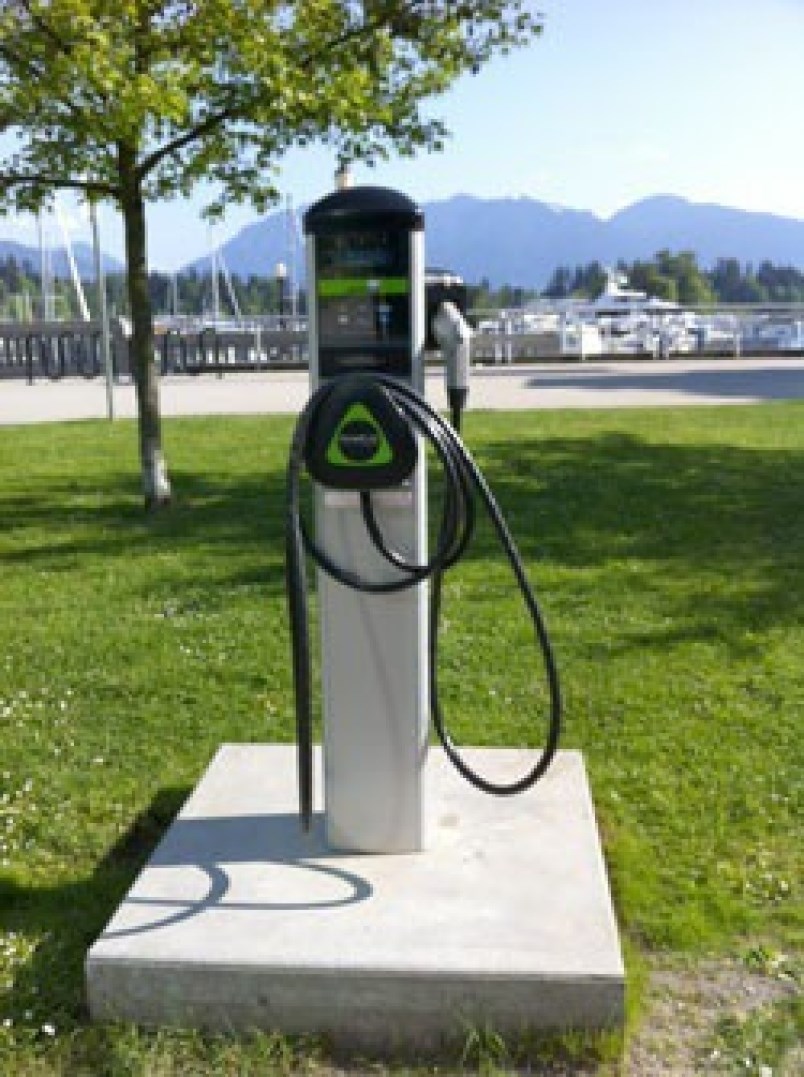Although eight Lower Mainland communities, including Port Coquitlam, are requiring developers to include electric vehicle charging stations, Coquitlam councillors had a mixed reaction to adopting one for the city.
A staff report presented to council by development planner Natasha Lock on Monday offered up four options. The first would require all residential spaces in multi-family developments to have an 240 volt outlet (Level 2). The second would see one parking space per unit for Level 2. The third would have all spaces outfitted for Level 1 (120 volts), with infrastructure capable of providing Level 2 or higher. The fourth was Level 1 for one parking space per unit.
Lock's report pointed out British Columbia leads the country with EVs, making up more than 1% of new car purchases, and that's expected to grow to about 24 to 27% by 2030.
The report also suggested developers be given a six-month grace period between the adoption of the new requirements and enforcement to avoid constraining proposals already being processed.
Coun. Craig Hodge, who owns an electric vehicle, is anxious to get the requirements in place. He favoured forcing developments to install 240 volt outlets and didn't think a grace period should be given.
“We’ve got so many buildings coming forward that if we allow too many to go ahead we’re building into obsolescence,” said Hodge, who noted he paid $1,100 to have a 240-volt outlet installed at his home.
Lock said a number of developers told the city the higher level of electrical power could make it too expensive. Although there are systems more expensive, the city is considering ones that have a cost of $270 to $750 per parking space.
Mayor Richard Stewart, who also owns an EV, didn't think the city needed to require Level 2. He said he's able to charge his car overnight, even in the winter, using a 110 volt outlet, and has driven round trips to Vancouver airport, downtown Vancouver and Abbotsford on an overnight charge.
“I suspect everybody could get by with Level 1, unless they’re using it 18 hours a day," said Stewart.
He added changing the playing field for developers in midstream isn't a good idea.
“I’m a bit concerned of having a short window for those that have already bought land and taken stuff to planning… and, oh by the way, your costs are going up again," said Stewart.
He suggested requiring 110 volts for two years and after that making Level 2 mandatory.
Vancouver and Richmond have adopted bylaws requiring all parking stalls to have Level 2, while Burnaby is on its way to doing so. PoCo is requiring one space per unit to have Level 2.
But Coun. Terry O'Neill said he wasn't confident the city understands the issue and the market well enough. He added it wasn't the city's job to force developers to provide charging outlets, even though it might make a purchase more attractive to potential buyers.
“I don’t want to do this because I think it’s going to sell condominiums," said O'Neill, who warned against driving up the taxes and fees for developers potentially killing projects. “We’re not talking about putting on a straw, but a bail of straw, on a camel’s back.
“I think we need a longer window so that developers don’t abandon projects because we’re adding costs on to it… I can’t support this right now.”
Coun. Bonita Zarrillo said she is worried about trying to regulate instead of letting the market dictate the need.
“If there's a need for more EV chargers, then the developers would provide it," said Zarrillo.
Coun. Dennis Marsden said as the number of electric vehicles increases, there's going to be a need for the outlets.
“Let’s not let imperfection stand in the way of progress here," said Marsden. “Our objective is to see what the community needs going forward, and I think the ability to have electric charging is going to be there. We’ve got to look toward the future and have that available for our citizens.”
Coun. Chris Wilson thought the report should have included visitor parking charging stations.
“If the vehicles are going to be as common as we think they are then we better make sure they have it available for visitor parking,” said Wilson.
Lock said it wasn’t dealt with because there were so many variations on how a strata charges its residents for the service.
“If there is a need for it, the unit owner could work it out with their visitor. Not that they would swap stalls, but that’s an option they could do. It revolves around who pays for that electricity cost,” said Lock.
Council asked Lock to come back with another report taking their feedback into consideration.
• This story has been changed to reflect the cost per parking space for the charging systems to be required by Coquitlam.



